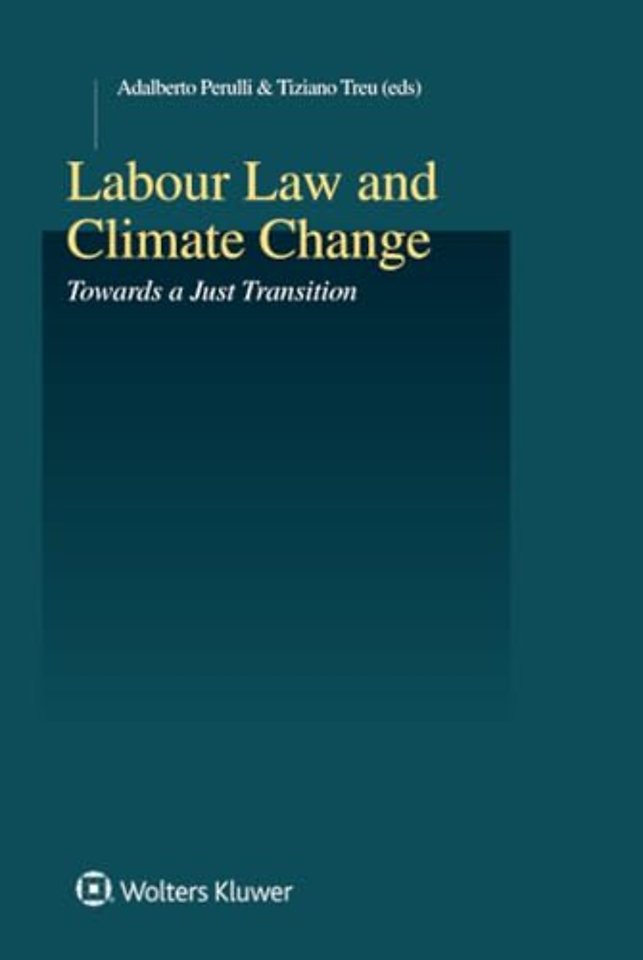Labour Law and Climate Change
Towards a Just Transition
Samenvatting
Studies in Employment and Social Policy # 57
About this book:
Labour Law and Climate Change, an extraordinarily significant book, with contributions by thirteen eminent labour law practitioners and academics, demonstrates how labour law not only can but absolutely must assume a grander role in the debate on the climate crisis and shift towards a new eco-friendly labour paradigm. Although the existential threat of climate change has at last been generally acknowledged, its influence on the labour market and the regulation of labour relations remains ambivalent at best.
What's in this book:
Committed to the proposition that employment must come to terms with the natural environment and open a new chapter in the relationship between human work and the Earth, critical issues and perspectives on the role of labour law in a just ecological transition have been examined, focusing on the following aspects:
- negative externalities associated with the value chains production model;
- (in)effectiveness of corporate social responsibility and sustainability initiatives;
- protection of human rights from violations attributable to private sector activities;
- protection of whistleblowers;
- need for professional training in new occupations;
- environmental migrants;
- reskilling and active inclusion of workers and jobseekers;
- role of remote work and flexible working time; and
- evaluation and reward of employees.
How this will help you:
The impingement of the green transition on industrial activities is generating substantial tensions among the social parties, leading inevitably to a major restructuring of enterprises and the relocation of thousands of workers. This exhaustive analysis of the ramifications of climate change for the labour contract and the industrial relations system furnishes suitable tools to understand trends and possible solutions for the future. It will be highly appreciated by managers, consultants, corporate lawyers, judges, human rights experts, trade unionists, researchers, and professors placed at the nexus of labour, industrial relations, and social rights in Europe and worldwide.
Specificaties
Inhoudsopgave
Contributors
Towards a Green Labour Law
Adalberto Perulli
PART I Environmental Humanities, Labour Law and Economy: An Interdisciplinary Dialogue
CHAPTER 1 The Impact of the Green Transition on Employment, Labour Law and Industrial Relations
Tiziano Treu
CHAPTER 2 Just Ecological Transition and Inequalities
Marzia Barbera
CHAPTER 3 The Fight Against Climate Change: Implications for Labour Law and Industrial Relations
Manfred Weiss
PART II Labour Market Facing with Climate Change: Critical Issues and Perspectives
CHAPTER 4 Policy and Regulatory Implications of Current Debates on Labour Market and Climate Change: Southern Perspective
Pablo Arellano Ortiz
CHAPTER 5 The Green Transition and New Skills in Occupation
Giuseppe Casale
CHAPTER 6 The Labor Instruments of Internal Flexibility at the Service of the Just Ecological Transition in the Context of the Next Generation EU
Margarita Miñarro Yanini
CHAPTER 7 Challenges When Combining Labour and Environmental Objectives: Trade and Sustainable Development Chapters and Beyond
Tonia Novitz
CHAPTER 8 The Role of Public Administration in Italy’s Integrated National Energy and Climate Plan
Elena Buoso
PART III Climate Change and Its Implications on Labour Contract and Industrial Relations System
CHAPTER 9 Climate Change, Sustainability, Organisational Changes and Workers’ Professionality
Elena Gramano
CHAPTER 10 Climate Change and Labour Law: Redefining the Collective Interest
Frank Hendrickx
CHAPTER 11 ‘Seeking Coherence: Climate, Capability, and a Human-Centred Approach’
Brian Langille
CHAPTER 12 Energy Poverty, Fair Transition and Labour Law
Pr. Sophie Robin-Olivier







